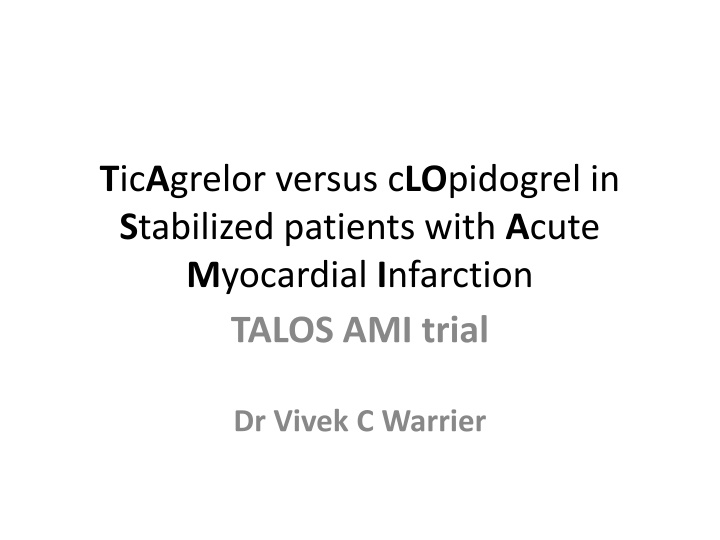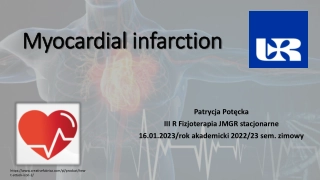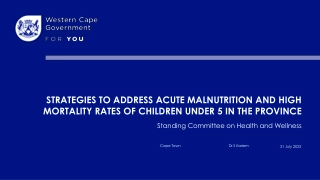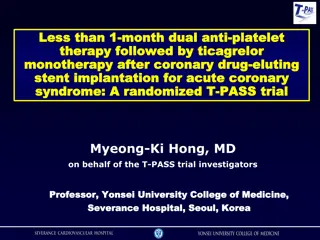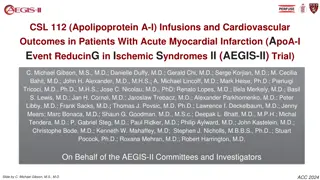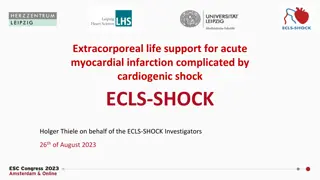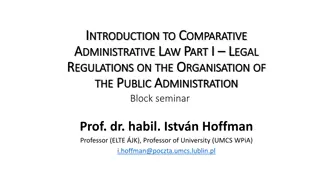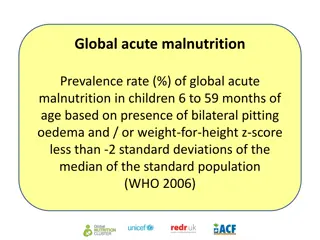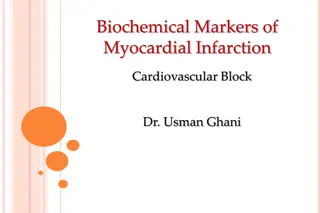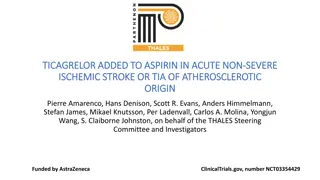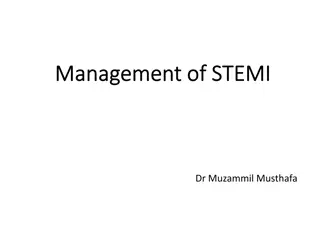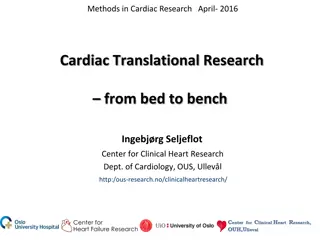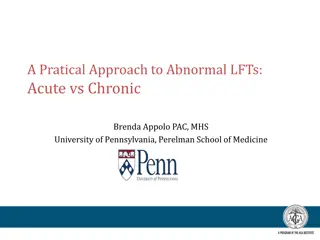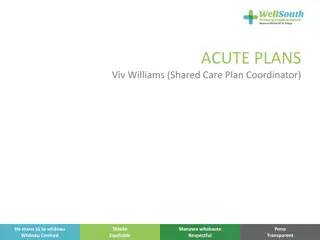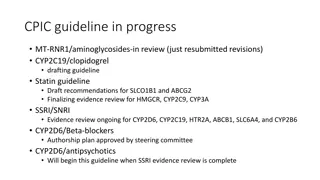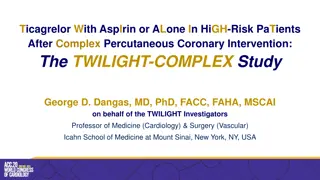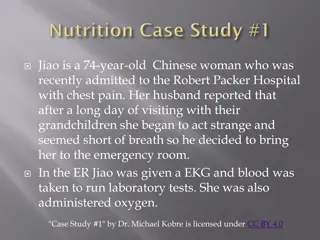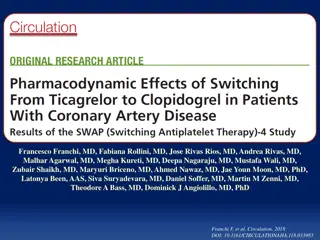Comparison of Ticagrelor vs Clopidogrel in Stabilized Acute Myocardial Infarction Patients
Potent P2Y12 inhibitors like ticagrelor have shown significant reduction in ischaemic events compared to clopidogrel in acute myocardial infarction patients. Despite the strong antiplatelet efficacy, there is a higher bleeding risk associated with potent P2Y12 inhibitors, prompting the exploration of de-escalating dual antiplatelet therapy to balance ischaemic benefit and bleeding risks. Previous trials like PLATO and TRITON-TIMI have provided insights into the safety and efficacy of ticagrelor and clopidogrel in patients with acute coronary syndromes. This summary delves into the background, rationale, and outcomes of these trials to guide optimal treatment strategies for AMI patients.
Download Presentation

Please find below an Image/Link to download the presentation.
The content on the website is provided AS IS for your information and personal use only. It may not be sold, licensed, or shared on other websites without obtaining consent from the author.If you encounter any issues during the download, it is possible that the publisher has removed the file from their server.
You are allowed to download the files provided on this website for personal or commercial use, subject to the condition that they are used lawfully. All files are the property of their respective owners.
The content on the website is provided AS IS for your information and personal use only. It may not be sold, licensed, or shared on other websites without obtaining consent from the author.
E N D
Presentation Transcript
TicAgrelor versus cLOpidogrel in Stabilized patients with Acute Myocardial Infarction TALOS AMI trial Dr Vivek C Warrier
BACKGROUND & RATIONALE Potent P2Y12 inhibitors, ticagrelor and prasugrel, significantly reduced ischaemic events compared to clopidogrel in two pivotal, large-scale clinical trials (PLATO , TRITON TIMI). Hence patients with acute myocardial infarction (AMI) undergoing percutaneous coronary intervention (PCI) are strongly recommended to take potent P2Y12 inhibitors preferentially over clopidogrel for one year. However, along with strong antiplatelet efficacy, a higher risk for bleeding was observed for potent P2Y12 inhibitors
Most bleeding events occurred predominantly during the maintenance period of treatment. To optimise net clinical benefit between early ischaemic benefit and late bleeding risks in AMI patients, the strategy of de- escalating dual antiplatelet therapy (DAPT) has gradually emerged as an important subject.
PLATelet inhibition and patient Outcomes (PLATO) (NEJM -2009) The goal of the trial was to evaluate the safety and efficacy of treatment with ticagrelor, a novel reversible oral P2Y12 receptor antagonist, compared with clopidogrel among patients with an acute coronary syndrome (ACS) with or without ST-segment elevation. Patients were randomized in a double-blind manner to ticagrelor (n loading dose 180 mg followed by 90 mg twice daily) or clopidogrel loading dose 300 mg followed by 75 mg daily), with study drug treatment to continue for up to 12 months.
Among patients with STE or non-STE ACS, treatment with the novel reversible oral P2Y12 receptor antagonist ticagrelor significantly reduced the composite endpoint of death from vascular causes, MI, or stroke by 12 months compared with clopidogrel, without an excess in the primary safety endpoint of major bleeding.
TRIAL TO ASSESS IMPROVEMENT IN THERAPEUTIC OUTCOMES BY OPTIMIZING PLATELET INHIBITION WITH PRASUGREL THROMBOLYSIS IN MYOCARDIAL INFARCTION - TRITON-TIMI (NEJM 2007) The goal of the trial was to evaluate treatment with a novel thienopyridine, prasugrel, compared with clopidogrel among patients undergoing planned percutaneous coronary intervention (PCI) for an acute coronary syndromes (ACS). The study demonstrated that use of an agent that confers greater platelet inhibition(prasugrel) was associated with a reduction in ischemic events as compared with clopidogrel.
However, with greater platelet inhibition, there was a significant excess of bleeding events in the prasugrel group, including life-threatening and fatal bleeding.
TICAGRELOR WITH OR WITHOUT ASPIRIN IN ACUTECORONARY SYNDROME AFTER PCI TICO (ACC -2020) The goal of the trial was to evaluate ticagrelor monotherapy after 3 months of dual antiplatelet therapy (DAPT) compared with 12 months of DAPT after percutaneous coronary intervention (PCI) for acute coronary syndrome (ACS). Among ACS patients who underwent PCI with an ultrathin biodegradable-polymer sirolimus-eluting stent, ticagrelor monotherapy after 3 months of DAPT was superior to standard therapy of DAPT for 12 months. Ticagrelor monotherapy was effective at preventing net composite ischemic and bleeding events
TICAGRELOR WITH ASPIRIN OR ALONE IN HIGH-RISK PATIENTS AFTER CORONARY INTERVENTION - TWILIGHT The goal of the trial was to compare the safety and efficacy of a short-duration dual antiplatelet therapy (DAPT) (3 months) followed by ticagrelor monotherapy compared with longer duration DAPT (12 months) among patients undergoing percutaneous coronary intervention (PCI) with a drug-eluting stent (DES) and with 1 high risk feature of ischemia or bleeding The TWILIGHT trial showed that short-duration DAPT (3 months) followed by ticagrelor monotherapy for 12 months results in less bleeding compared with longer-duration DAPT (additional 12 months) ; ischemic rates met criteria for noninferiority.
SHORT AND OPTIMAL DURATION OF DUAL ANTIPLATELET THERAPY AFTER EVEROLIMUS- ELUTING COBALT-CHROMIUM STENT-2 - STOPDAPT2 JAMA 2019 Goal of the trial was to evaluate 1-month dual antiplatelet therapy (DAPT) compared with 12-month DAPT among patients undergoing percutaneous coronary intervention (PCI). Patients undergoing PCI were randomized to 1 month of DAPT followed by clopidogrel monotherapy for 5 years versus 12 months of DAPT followed by aspirin monotherapy for 5 years
Among patients undergoing PCI for stable and unstable cardiovascular disease, 1-month DAPT followed by clopidogrel monotherapy was superior to 12-month DAPT followed by aspirin monotherapy at preventing net adverse clinical events. One-month DAPT was noninferior to 12-month DAPT at preventing major adverse ischemic events & superior to 12- months DAPT at preventing TIMI major/minor bleeding.
TESTING RESPONSIVENESS TO PLATELET INHIBITION ON CHRONIC ANTIPLATELET TREATMENT FOR ACUTE CORONARY SYNDROMES - TROPICAL-ACS (EUR HEART JOURNAL 2019) patients with acute coronary syndrome who underwent percutaneous coronary intervention (PCI) were randomized to de-escalation of antiplatelet therapy vs. prasugrel for 12 months . In the de-escalation group, participants were treated with prasugrel for 1 week, then clopidogrel for 1 week at which time they underwent platelet function testing. If high platelet reactivity was documented, they were switched back to prasugrel. Otherwise, they remained on clopidogrel for 1 year
Among patients with acute coronary syndrome (STEMI or NSTEMI), de-escalation of maintenance antiplatelet therapy was noninferior to 12 months of prasugrel - regarding the primary outcome of cardiovascular death, MI, stroke, or bleeding BARC 2
TIMING OF PLATELET INHIBITION AFTER ACUTE CORONARY SYNDROME TOPIC EUR HEART JOURNAL 2017 The goal of the trial was to evaluate long-term treatment with aspirin/clopidogrel (switched dual antiplatelet therapy [DAPT]) compared with aspirin/newer ADP antagonist (unchanged DAPT) after 1 month of initial treatment with aspirin/newer ADP antagonist for an acute coronary syndrome. TOPIC trial showed that de-escalation was superior at preventing net ischemic events & was associated with a reduction in bleeding (BARC 2)
CYP2C19 GENOTYPE-GUIDED ANTIPLATELET THERAPY IN ST-SEGMENT ELEVATION MYOCARDIAL INFARCTION PATIENTS PATIENT OUTCOME AFTER PRIMARY PCI - POPULAR GENETICS (NEJM 2019) The goal of the trial was to evaluate a genotype-guided strategy for selection of oral P2Y12inhibitor compared with standard therapy with ticagrelor or prasugrel among patients undergoing primary percutaneous coronary intervention (PCI) for ST-segment elevation myocardial infarction (STEMI).
Patients undergoing primary PCI for STEMI were randomized to a genotype-guided strategy for selection of oral P2Y12inhibitor versus standard therapy with ticagrelor or prasugrel . In the genotype-guided group, detection of CYP2C19*2 or CYP2C19*3 resulted in the use of ticagrelor or prasugrel. Otherwise patients received clopidogrel. Among patients with STEMI undergoing primary PCI, a genotype-guided strategy vs. standard of care was associated with noninferiority with respect to a net composite outcome. A genotype-guided strategy was associated with superiority with respect to major or minor bleeding
AIM The goal of the trial was to assess whether de- escalating dual antiplatelet therapy (DAPT) with clopidogrel rather than ticagrelor 1 month after percutaneous coronary intervention (PCI) for an acute myocardial infarction (AMI) would be a noninferior strategy.
STUDY DESIGN After successful PCI for AMI, all patients received aspirin + ticagrelor for 30 7 days. Patients without adverse events were randomized to continuing DAPT in a 1:1 open-label fashion with either aspirin + clopidogrel 75 mg daily (de-escalation, n = 1,349) or aspirin + ticagrelor 90 mg BID (n = 1,348). In the de-escalation arm, clopidogrel was administered without a loading dose.
PRINCIPAL FINDINGS The primary endpoint of cardiovascular death, MI, stroke, Bleeding Academic Research Consortium (BARC) bleeding 2,3, or 5, for de-escalation vs. active control between 1 and 12 months post-PCI, was: 4.6% vs. 8.2% (p for noninferiority < 0.001, p for superiority < 0.001). Secondary outcomes: Cardiovascular death, MI, stroke: 2.1% vs. 3.1% (p = 0.15) BARC 2,3, or 5 bleeding: 3% vs. 5.6% (p = 0.001)
RESULTS The results of this trial indicate that among patients undergoing PCI for AMI and who had completed 1 month of DAPT with aspirin and ticagrelor uneventfully, switching to aspirin + clopidogrel for the next 11 months met criteria for noninferiority and superiority compared with continuing with aspirin + ticagrelor. This was primarily driven by a reduction in major bleeding, but ischemic events were also numerically lower with a de- escalation strategy.
De-escalation was performed without genotype testing or reload. These are interesting data and are likely to be clinically relevant and cost-effective. The only caveat is that this trial only included East Asian patients, so the generalizability in the United States is unclear.
